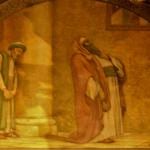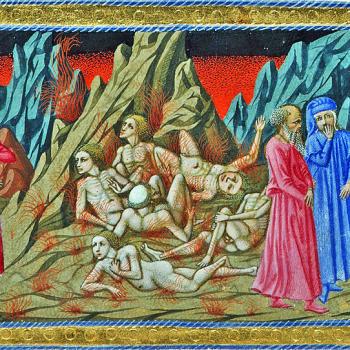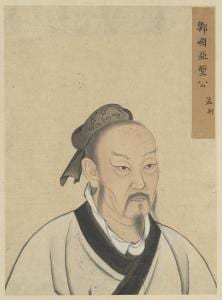
When we look across history, as well as in the present, we can find a mix of good and bad coming from humanity. We see people who have lived good and noble lives, filled with selfless love, giving of themselves to others, even dying so that others can live, even as we can find some living a life of selfishness, taking whatever they can from others, doing whatever they can to appease their own desires, no matter the consequences of their actions. History is filled with much good and evil, and because of this fact, it is often asked, which best represents humanity, which best presents to us the reality of human nature: the good or the bad? Is humanity naturally good or is it naturally bad?
The natural character of humanity is a question which people from different religious and philosophical traditions have raised, and, despite commonly held beliefs, we find people of the same religious faith, or the same philosophical school of thought, often answer the question differently from each other. Thus, many Christians say that human nature is intrinsically good, while others suggest human nature is not only basically evil, it has been totally compromised by evil and so is, by itself, absolutely evil.
We can see that this question arose within the Confucian tradition with two of its early adherents coming to differing conclusions. One Confucian sage, Mencius (c. 372 – 289 BCE), said that human nature is good, while another, Xunzi (or Hsün Tzu, c. 310 – c. 235 BCE) believed that humanity is naturally evil. When we examine the way Mencius and Xunzi argue their points, we can see that, though they do disagree with each other, they do so in part because they hold a different understanding as to what it means to talk about human nature. This an important point because when we read any author talking about human nature, we must know what it is they mean by it, otherwise, we will likely misunderstand them and engage them through equivocation. To make this clear, we should examine the arguments which Mencius and Xunzi made, and so discern through them, what it is they were discussing, where their disagreement can be found, and what allowed them to nonetheless represent Confucian thought despite their differences.
Confucius, it is said, was silent concerning human nature:
Tzu-Kung said, Our Master’s views concerning culture and the outward insignia of goodness, we are permitted to hear; but about Man’s nature and the ways of Heaven he will not tell us anything at all.[1]
If one examines the saying and deeds attributed to Confucius, it is clear, he held some views concerning humanity, but he did not expound upon them in any systematic form. This is why his successors can and did offer rival views on humanity and its goodness: in doing so, they did not go against the teachings of the Master, since he did not make any express teachings. Instead, they were actively engaging what they learned from him and put it into use to answer questions which were of concern to them in their own philosophical activity, among which, was the was the question of humanity and its natural condition.
Mencius preceded Xunzi, and so his position, that humanity was naturally good, preceded Xunzi’s, allowing it to be something which Xunzi could argue against when he made his own position clear. For Mencius, what made for the human condition is what made humanity different from any other animal. He designated this to be the “heart.” This heart, he said, is filled with good qualities which every person possessed, even if they did not truly activate or cultivate them. The human heart could be broken down into four different aspects, each which represents the natural goodness of humanity:
‘As for as what is genuinely in him is concerned, a man is capable of becoming good,’ said Mencius. ‘That is what I mean by good. As for his becoming bad, this is not the fault of his native endowment. The heart of compassion is possessed by all men alike; likewise, the heart of shame, the heart of respect, and the heart of right and wrong. The heart of compassion pertains to benevolence, the heart of shame to dutifulness, the heart of respect to the observance of the rites, and the heart of right and wrong to wisdom. Benevolence, dutifulness, observance of the rites, and wisdom are not welded on to me from the outside; they are in me originally.’ [2]
While we do not always exercise the qualities of our heart, all of us possess within us the four great qualities associated with the human heart – compassion, shame, respect, and knowledge of right and wrong (the conscience). Each of them inspire and help direct us throughout our lives. Everyone one of us has felt sorrow and compassion for someone else; every one of us has felt shame at something which we have done; every one of us has felt reverence and respect to someone other than ourselves; and every one of us has shown that we have some sort of notion of right or wrong, whether or not we let that notion have the final say in determining what we do. We might try to block these aspects of ourselves, or we can try to cultivate them; those who block them turn away from their humanity, becoming like a beast, showing that such evil is not natural but contrary to human nature, while others cultivate them, making themselves great sages or great “gentlemen” in the process:
Mencius said, ‘A gentleman differs from others in that he retains his heart. A gentleman retains his heart by means of benevolence and the rites. The benevolent man loves others, and the courteous man respects others. He who loves others is always loved by them; he who respects others is always respected by them.’ [3]
What is important is to realize how Mencius explained that humanity is naturally good, The heart, with its good qualities, was given to us from Heaven. All of us have the potential to cultivate the good within and to become great, while on the other hand, if we let other qualities within us, other aspects of our human nature direct us in a disproportionate way, we can let them ensnare our heart and turn us away from our natural benevolence:
Heaven has not sent down men whose endowment differs so greatly. The difference is due to what ensnares their hearts. Take the barley for example. Sow the seeds and cover them with soil. The place is the same and the time of sowing is the same. The plants shoot up and by the summer solstice they all ripen. If there is any unevenness, it is because the soil varies in richness and there is no uniformity in the fall of rain and dew and the amount of human effort devoted to tending it. [4]
What is important is for us to know ourselves by cultivating the heart, and in doing so, we will thrive by the nature given to us from Heaven and so come to know Heaven and its will for us:
Mencius said, ‘For a man to give full realization to his heart is for him to understand his own nature, and a man who knows his own nature will know Heaven. By retaining his heart and nurturing his own nature he is serving Heaven.’ [5]‘’
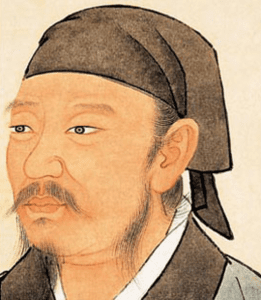
Now Xunzi, coming a few decades later, disliked all the evil he saw coming from humanity; he believed that the various desires which we have lead us to do that evil, and so that what is natural for us is to fulfill those desires and do what is evil. This, he believed, shows that human nature is itself evil. For what is with us all our lives are those base desires; the cultivated heart with all its benevolence is not found in everyone, and so cannot be said to be a part of human nature but something which is created and established over it in order to make us better. It is, as it were, an external tool, discovered by ancient sages, something which can be developed but is not developed by all. When it first was developed, it was seen to help those who developed those qualities, so the sages promoted its cultivation, hoping to guide and direct humanity for its own good, but nonetheless, because it takes cultivation, both from education but also from the discipline which comes out of the various rites which we can be made to follow, it is not natural to us, and so is not something which can be used to demonstrate the goodness of humanity.
Human nature is naturally wicked; it has people seek out their own pleasures, their own private interests, and only when they can be shown that their private interests are best satisfied by cultivation of what is truly good, can they be motivated to do what is contrary to their nature, and establish for themselves something better. Thus, Xunzi wrote:
Man’s nature is evil; goodness is the result of conscious activity. The nature of man is such that he is born with a fondness for profit. If he indulges this fondness, it will lead him into wrangling and strife, and all sense of courtesy and humility will disappear. He is born with feelings of envy and hate, and if he indulges these, they will lean him into violence and crime, and all sense of loyalty and good faith will disappear. Man is born with desires of the eyes and ears, with a fondness for beautiful sights and sounds. If he indulges in these, they will lead him into license and wantonness, and all ritual principles and correct forms will be lost. Hence, any man who follows his nature and indulges his emotions will inevitably become involved in wrangling and strife, will violate the forms and rules of society, and will end as a criminal. [6]
Mencius was wrong because goodness needs to be cultivated; how, if it was not always with it, can it be seen as a part of human nature?
Mencius says that man is capable of learning because his nature is good, but I say this is wrong. It indicates that he has not really understood man’s nature nor distinguished properly between the basic nature and conscious activity. The nature is that which is given by Heaven; you cannot learn it, you cannot acquire it by effort. Ritual principles, on the other hand, are created by sages; you can learn to apply them, you can work to bring them to completion. The part of man which cannot be learned or acquired by effort is called nature; that part of him which can be acquired by learning and brought to completion by effort is called conscious activity. [7]
It is from its evil desires, however, that humanity can and does produce what is good, because it sees those desires are best fulfilled by cultivating the good. Thus, the natural state is evil, but humanity can overcome that natural state and will do so when it sees fulfilling the good can better satisfy its desires and needs than by simply trying to fulfill them without such cultivation. We will long for what is outside of ourselves, and in doing so, we can discover many things which are good and beautiful. They will attract us, and in doing so, we will be guided by them, but it is still the evil within us which leads us to follow and act upon such good:
Every man who desires to do good does so precisely because his nature is evil. A man whose accomplishments are meager longs for greatness; an ugly man longs for beauty; a man in cramped quarters longs for spaciousness; a poor man longs for wealth; a humble man longs for eminence. Whatever a man lacks in himself he will seek outside. [8]
Xunzi, in this way, anticipates some of the arguments which will emerge in objectivism, with the belief that selfishness can and will lead to virtue, because such selfishness will discern how virtue can be used to best obtain our desires. The sages discerned this; in their greatness, they taught us rituals and gave us their expert guidance so that we can move beyond our natural evil:
Someone may ask whether ritual principles are concerted conscious activity are not themselves a part of man’s nature, so that for that reason the sage is capable of producing them. But I would answer that this is not so. A potter may mold clay and produce an earthen pot, but surely molding pots out of clary is not a part of the potter’s human nature. [9]
Thus, Xunzi explained further:
I would reply: all ritual principles are produced by the conscious activity of the sages; essentially they are not products of man’s nature. A potter molds clay and makes a vessel, but the vessel is the product of the conscious activity of the porter, not essentially a product of his human nature. [10]
We see, therefore, Mencius and Xunzi looked upon humanity with different intentions. Mencius sees that there is always something which makes us human within the heart, something which, even if it not cultivated, is always there with us, suggesting ways we can and should act, making us superior to other forms of life. Xunzi was more concerned with actions instead of potentiality; what he observed was that the actions of humanity suggested that those qualities of the heart were not always found in each and every person. It is something which is not with us from birth, but rather, is something which each of us can develop, especially if we are directed to develop it from some external pressure. Mencius focused himself on the good which he believed all humanity can achieve, a good contained within all even if it is not cultivated, as proof of the natural goodness of humanity, while Xunzi viewed the fact that not all humans cultivate the good shows it is not inherent to humanity and so humanity is not to be said to be naturally good. D.C. Lau, in his introduction to the writing of Mencius, indicated this distinction was important if we wanted to understand what both of the philosophers meant:
We can now see that Mencius and Hsün Tzu took a very different line in the matter of the definition of the nature of a thing. Mencius was looking for what was distinctive while Hsün Tzu was looking for what forms an inseparable part of it. For this reason, desires do not qualify, for Mencius, as a defining characteristic of the nature of man because they are shared with animals. The heart, and in particular the incipient moral tendencies in the human heart, is what distinguishes a man from animals, and as such is a higher organ than his senses. For Hsün Tzu, on the other hand, only what is instinctive can be counted as nature, and the heart with its very possibilities disqualifies itself.[11]
Both Mencius and Xunzi believed that it is important to cultivate the good and that humans can do so. They believed in the potential to do such good, with Mencius suggesting that by possessing such potential, human nature is good. Xunzi disagreed, and said that the fact it is merely a potential and not a reality for everyone meant it is not natural. They were in agreement with Confucian ideals of cultivating the good through education and ritual, to become sages, but they differed in relation to their interpretation of what is and is not human nature. Thus, they still held much in common, even if they had different understandings of human nature and whether or not it was good of bad.
Seeing how Confucians can disagree with each other, in part, due to different meanings of what it meant to talk about human nature, we can use this to help us understand something similar happens in Christian arguments concerning human nature. The view which says humanity is good argues from ontology, while others, in saying it is bad, are more interested in what they have seen humanity has done throughout its existence. Likewise, one view often looks at humanity and human nature as what was found before sin contaminated it, while others consider the state of humanity after the fall and declare that to be human nature. It is possible, therefore, to reconcile these two views, if one views latter viewpoint, not as an ontological statement concerning human nature, but rather as a practical analysis of humanity after the fall, so that what is being discussed is not human nature as it was created by God but rather, concupiscence and the effects of the fall on the will. If, however, some want to suggest that at its inception, humanity was naturally evil, then that position cannot be reconciled with those who say humanity is naturally good. Likewise, such a view would have problems dealing with Scripture, such as when it said that everything was created by God as good: “And God saw everything that he had made, and behold, it was very good” (Gen. 1:37a RSV). Humanity, created by God, should be seen as good; indeed, there is something great in humanity that it is not only good, but it is a good which in some way can be said to imagine God: “So God created man in his own image, in the image of God he created him; male and female he created them” (Gen. 1:27 RSV).
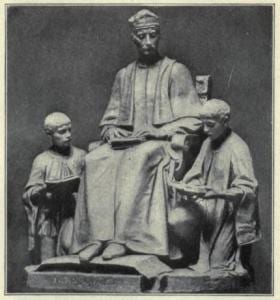
Following Genesis, then, we should say that evil, not goodness, is unnatural; and evil, when it is cultivated, it turns us away from our natural goodness. All the virtues were created with us and so are a part of us and our human nature. “The principal and primary virtues were co-created with man as part of his nature. From them the rivers of all the other virtues are filled as from four well-heads, and they water the city of God, which is the heart cleansed and refreshed by tears.” [12] But we are still given choice, the ability to act either according to nature and our natural goodness, or act contrary to that nature, to cultivate bad habits, becoming, as it were, attached to a private (individualized), and therefore unnatural mode of being. Because it is not a part of who we are by nature, it becomes something individual, something personal, and so through our actions, we can create for ourselves an evil personality which runs contrary to our natural goodness. Since it is unnatural, we can free ourselves from such evil and return to the good which is natural too us, as John Colet stated:
There is in man an undivided and single element, which belongs to his nature. If it is obscured and weakened by evil multiplicity it wavers and falters. A man must rid himself entirely of this hampering condition and restore inmost undividedness so as to be once more himself and appear naked, pure, and simple. With all these hindrances removed and the weight shaken off that had weighed him down, let him be fully and utterly himself, liberated now and free from the condition of dividedness or distraction, exposed to God on high in singleness and undividedness, naked and open in himself. The man who appears thus in the sight of God the supreme sun is receptive to the divine ray and derives from it light and warmth. This element of the undividedness in man Paul calls “the inner man” [Eph. 3:16], while the Savior calls it in the Gospel “the eye of man,” which “if it be single the whole body will be light” [Matt. 6:22].[13]
It is because human nature is good that God can assume humanity and become one of us. It is because human nature is good that we can know God through knowing ourselves, seeing that the goodness within us points to the greater goodness of God. It is because human nature is good that what God offers us is a restoration and recreation of that natural goodness. However, because of original sin, and through it, concupiscence, we can see in human history all the great evil which we can and do produce, and so we can say, in a way, when we see someone falter and do what is wrong, it is perfectly human that they have done so. But we must do so with care, realizing it is human only in relation to the fallen state of being after the fall. We are used to what humanity has made for itself in relation to the fall, and so call humanity bad; it is but a convention, and if treated as such, many theological problems would go away.
Thus, care must be had to know what people mean when they say it is only human when people sin, to know that many are only indicating what has become of humanity after the fall, and not what human nature, as an essence, is meant to be like. Those who misread this can and do use such talk to misconstrue the arguments of those they read and come to a conclusion that humanity is totally deprived of goodness by nature. In doing so, they show how equivocation is possible and can lead to a bad conclusion, for that conclusion then would implicate God in making humanity evil. Ontologically humanity is good, for it was created by God who is all good and makes all things good. Thus, as with the Confucian tradition, so within Christian debates, we must ask what is meant by people when they talk about human nature: are they talking about the essence of humanity as given to it by God, or are they talking about the state of humanity after the fall? If the latter, we can certainly see the evil within humanity and understand how and why it is called evil from its actions. Despite such evil, there remains much which is good, and so even if we describe the human condition is evil, it is not entirely evil. Saying humanity is evil as a result of looking at such evil in human history must not lead us to notions which suggest humanity is entirely and totally evil; for though we are fallen, we still do good. If do not acknowledge this then we will call what is good, evil, and in the end, blaspheme God, for all that is good participates in the goodness of God. If what is good is really evil, then that good as it is in God is also evil, making God evil instead of good. This, of course, is why it is important to acknowledge, for all the evil done by humanity, for all the sin seen in history, fundamentally, that is, by nature, humanity is good, even if we can and should recognize despite that good, it often falters from its natural goodness and does what is evil and can, through a metaphoric convention, be described as evil.
[1] Confucius, The Analects of Confucius. Trans. Arthur Waley (New York: Vintage, 1989), 110 [V.12].
[2] Mencius, Mencius. Trans. D.C. Lau (London: Penguin Books, 1970), 163.
[3] Mencius, Mencius, 133-4.
[4] Mencius, Mencius, 164.
[5] Mencius, Mencius, 182.
[6] Hsün Tzu, Basic Writings. Trans. Burton Watson (New York: Columbia University Press, 1963), 157.
[7] Hsün Tzu, Basic Writings, 158.
[8] Hsün Tzu, Basic Writings, 161.
[9] Hsün Tzu, Basic Writings, 164.
[10] Hsün Tzu, Basic Writings, 160.
[11] Mencius, Mencius. Trans. D.C. Lau (London: Penguin Books, 1970), 21 [From DC. Lau’s introduction].
[12] Nikitas Stithatos, “On the Inner Nature of Things,” in The Philokalia: The Complete Text. Volume Four. Trans and ed. G.E.H. Palmer, Philip Sherrard and Kallistos Ware, et. al. (London: Faber and Faber, 1995), 110 [#12].
[13] John Colet, “On the Sacraments,” trans. John B. Gleason in John B. Gleason, John Colet (Los Angeles: University of California Press, 1989), 317.
Stay in touch! Like A Little Bit of Nothing on Facebook.
If you liked what you read, please consider sharing it with your friends and family!


